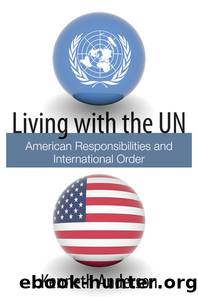Living With the Un: American Responsibilities and International Order by Kenneth Anderson

Author:Kenneth Anderson [Anderson, Kenneth]
Language: eng
Format: epub
Tags: Political Science, General, Human Rights
ISBN: 9780817913465
Google: Fxk_ULf-MKgC
Goodreads: 16718897
Publisher: Hoover Press
Published: 2011-12-01T00:00:00+00:00
1. If one takes all the various UN agencies and organs, including ones that are part of the UN family, at least on paper, but effectively self-financed through voluntary contributions and self-run, the figure is roughly $20 billion annually. But that figure includes many agencies and functions that are not really about the political and governance issues at hand. This estimate is Jussi M. Hanhimakiâs in The United Nations: A Very Short Introduction (New York: Oxford University Press, 2008), 45; it is in my estimation about right.
2. This figure is from the UN public relations page on the budget: âIs the United Nations Good Value for the Money?,â Image and Reality: Questions and Answers about the UN (June 30, 2006), available at http://www.un.org/geninfo/ir/index.asp?id=150. See note 6 for why I have opted to have the figures in this chapter range across so many years. It is to emphasize their relative stability and the stability of the arguements I make about them.
3. Neil MacFarquhar, âMoney Fights Are Brewing at the United Nations as Its Budget Season Heats Up,â New York Times, November 8, 2009, A16.
4. As of 2005, the top ten countries in regular assessed contributions were US (22 percent), Japan (19.47), Germany (8.66), UK (6.13), France (6.03), Italy (4.89), Canada (2.81), Spain (2.52), China (2.05), and Mexico (1.88). âIs the United Nations Good Value for the Money?â
5. âIs the United Nations Good Value for the Money?â
6. Throughout this discussion, I have deliberately used figures that range across years from the mid-2000s until today. The point is that whatever the exact numbers in any given UN budget cycle, they are roughly in these ranges over half a decade or more. They are relatively stable indicators of the amounts of money the UN spends on various activities. For the high-altitude purposes of this discussion, this is sufficient to show the general amounts and trends.
7. John Bolton, Surrender Is Not an Option: Defending America at the United Nations and Abroad (New York: Threshold-Simon & Schuster, 2007), 239â45. It bears noting that Bolton disagrees with the opening assessment of this chapter that the amounts of money at issue are not greatly significant in absolute terms. This is relevant in part because Bolton is highly experienced with the inner workings of UN budgets, fiscal accountability, and all the rest that diplomats frequently gloss over.
8. Bolton, 239. As Bolton said, âReform is not a one-night stand.â
9. A convenient summary version of the reports can be found in a book by Volckerâs aides: Jeffrey A. Meyer and Mark G. Califano, Good Intentions Corrupted: The Oil-for-Food Scandal and the Threat to the U.N. (Based on the Reports of the Independent Inquiry Committee, Paul A. Volcker, Chair) (New York: Public Affairs, Perseus, 2006).
10. The entire affair exposed one of the peculiar gaps in the UN systemâit is so insulated from accountability that there is no clear mechanism even for filing criminal charges against its personnel for embezzlement or other serious financial crimes. Governments protect their own no matter what, and
Download
This site does not store any files on its server. We only index and link to content provided by other sites. Please contact the content providers to delete copyright contents if any and email us, we'll remove relevant links or contents immediately.
The Secret History by Donna Tartt(19092)
The Social Justice Warrior Handbook by Lisa De Pasquale(12191)
Thirteen Reasons Why by Jay Asher(8912)
This Is How You Lose Her by Junot Diaz(6889)
Weapons of Math Destruction by Cathy O'Neil(6281)
Zero to One by Peter Thiel(5802)
Beartown by Fredrik Backman(5759)
The Myth of the Strong Leader by Archie Brown(5509)
The Fire Next Time by James Baldwin(5449)
How Democracies Die by Steven Levitsky & Daniel Ziblatt(5219)
Promise Me, Dad by Joe Biden(5154)
Stone's Rules by Roger Stone(5088)
A Higher Loyalty: Truth, Lies, and Leadership by James Comey(4964)
100 Deadly Skills by Clint Emerson(4927)
Rise and Kill First by Ronen Bergman(4790)
Secrecy World by Jake Bernstein(4753)
The David Icke Guide to the Global Conspiracy (and how to end it) by David Icke(4720)
The Farm by Tom Rob Smith(4514)
The Doomsday Machine by Daniel Ellsberg(4490)
